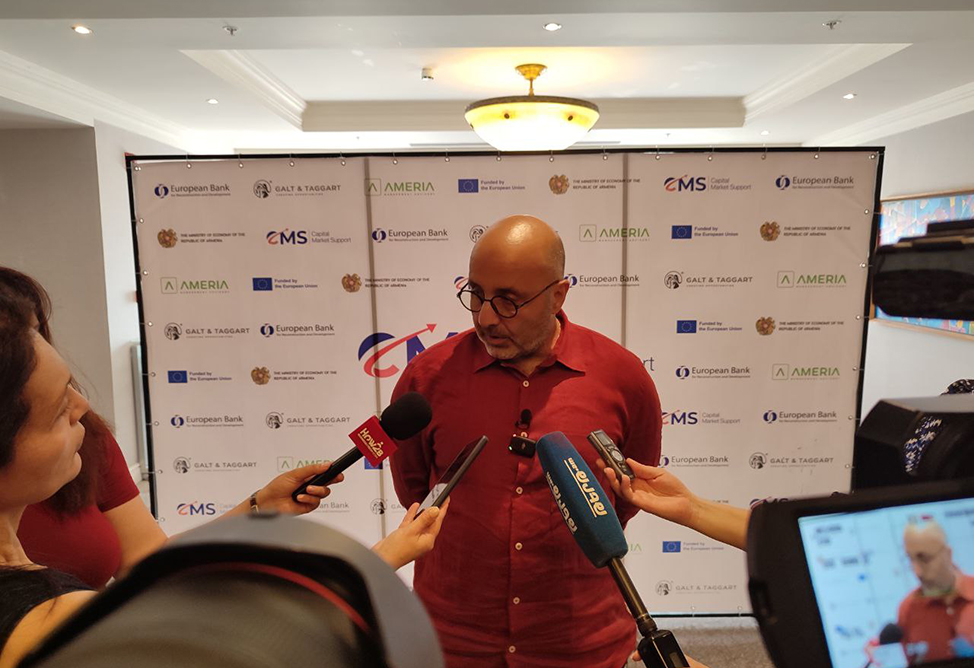EBRD and EU jointly implement capital market support program in Armenia

YEREVAN, May 30. /ARKA/. An educational conference entitled “Capital Markets: Preparation and Coordination” was held on Thursday in Yerevan, becoming the first event as part of a program designed to support the capital market in Armenia.
The program, worth approximately €500,000, was launched by the European Bank for Reconstruction and Development (EBRD) and the EU in December 2024 in partnership with the Georgian investment banking and brokerage firm Galt & Taggart and the consulting firm Ameria.
The program is designed for companies that issue capital market instruments and complements the bond and stock issuance support program currently being implemented by the Armenian Ministry of Economy.
The program will provide capacity building support and consulting on the issuance preparation process, as well as additional financial assistance to individual companies.
About the Armenian capital market
"The capital market in Armenia is currently at a rather interesting stage of development. There is already a fairly large volume of debt securities, and it is very encouraging that over the past year and a half, not only have bank debt securities been issued, but the real sector has also begun to issue securities,” said Tigran Jrbashyan, head of the consulting firm Ameria.
According to him, the development of the debt bond market is the first stage in the development of capital markets.
“Another issue is that the stock market is not yet very developed. We have open joint-stock companies, but the turnover of their shares is still very low. I believe there is a lot of work to be done here. It is clear that companies, in order to familiarize themselves with the depth, opportunities, and conditions of the market, as well as to calculate costs, are starting with debt securities, testing the market, and gradually preparing to issue equity securities,” he said.
Speaking about the obstacles to the development of the capital market in Armenia, Jarbashyan noted that they are about the rights of companies in general.
“I believe that the most serious task facing Armenia is to reform the legislation on companies. The current legislation was developed in the mid-1990s, and it must also evolve along with our development,” he said.
The second problem, according to Jarbashyan, is the issue of corporate transparency.
“When you enter the capital market, even with debt securities, you need to ensure a certain level of transparency in terms of both financial and general functions. And there is still a lot of work to be done here,” he said.
As a positive factor, he noted the adoption last year of the Corporate Governance Code, which is not mandatory but serves as a guideline.
Giorgi Kuprashvili, CEO of Galt&Taggart, believes that the capital market in Armenia is developing at a very good pace. Speaking about possible obstacles to the development of the capital market, he said in response to a question from the ARKA news agency that this program is aimed precisely at identifying possible obstacles and eliminating them where possible.
In this regard, Kuprashvili pointed out two main problems. “The first concerns awareness, especially when it comes to new issuers or market participants—how informed they are and how ready they are to engage in this corporate activity. The second is the educational component or capacity building,” he said, adding that these same problems existed in Georgia.
In the context of state-level support in Armenia, he said that at this early stage of development, government support could lead to positive results.
“We have already had meetings at the Central Bank, in various ministries, at the government level, and we see that there is a willingness to support and stimulate this program,” Kuprashvili said.
Rada Tomova, Director of Financial Markets and Capital Markets Development at the European Bank for Reconstruction and Development (EBRD), noted that the capital market in Armenia is in its early stages of development, but positive results can already be seen.
“Over the past few months, four issuers have entered the capital market, and we expect similar developments in the coming months. We would like to see a comprehensive list of entities interested in entering the capital market,” she said.
According to Tomova, it is expected that there will be more companies represented on the capital market, more issuers, more transparency, and more financial developments.
“Our goal is to provide all possible assistance for entering the capital market and stimulating it in Armenia,” she added.
About the program
Noting that America and Galt & Taggart are the entities responsible for implementing the program, co-financed by the EBRD and the EU, Jarbashyan explained that its main idea is to to provide consulting and financial assistance to companies wishing to test the market and issue securities, selecting pioneer companies. “The program is being implemented at a very opportune moment: the market is heating up, everyone is talking about it, everyone is interested, and this small impact can yield big results,” he said.
According to Jarbashyan, the conference, which also has an educational component, aims to present the successful experiences of companies that have gone down this path, as well as to identify possible obstacles.
"A list of potential beneficiaries is currently being finalized in terms of their greater readiness. The participation of the EBRD and the Ministry of Economy is important in this process, as it is not only about helping these companies, but also the market as a whole. It is clear that companies should not be from the banking sector; assistance is needed to help companies from the real sector enter the market,” he said.
Kuprashvili, in turn, noted that this program is a kind of catalyst that stimulates development. “And we see quite a lot of potential in terms of both capital market development and working with clients,” he added.
The program will be regulated by Armenia's legal framework and will be based on the capital market infrastructure. This will expand the sources of financing for local companies and help attract financing from local and foreign investors, which should lead to increased stability and flexibility in Armenia's private sector, contributing to economic growth. -0-



